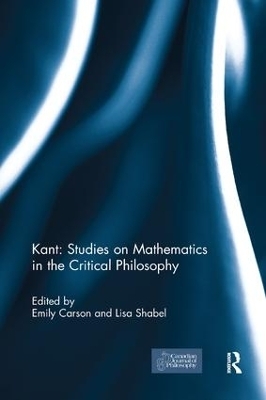
Kant: Studies on Mathematics in the Critical Philosophy
Routledge (Verlag)
978-1-138-09481-9 (ISBN)
Emily Carson is Associate Professor of Philosophy at McGill University, Montreal, Canada. She works in early modern philosophy, with a focus on Kant and the philosophy of mathematics, and is a member of the Editorial Board of the Canadian Journal of Philosophy. Lisa Shabel is Associate Professor in the Department of Philosophy at Ohio State University, Columbus, USA. Her primary interests are in the history and philosophy of mathematics and Kant’s Critical philosophy.
Introduction 1. Spatial representation, magnitude and the two stems of cognition 2. Infinity and givenness: Kant on the intuitive origin of spatial representation 3. Kant on the Acquisition of Geometrical Concepts 4. Kant (vs. Leibniz, Wolff and Lambert) on real definitions in geometry 5. Definitions of Kant’s categories 6. Arbitrary combination and the use of signs in mathematics: Kant’s 1763 Prize Essay and its Wolffian background 7. Kant on the construction and composition of motion in the Phoronomy 8. Kant on conic sections 9. ‘With a Philosophical Eye’: the role of mathematical beauty in Kant’s intellectual development
| Erscheinungsdatum | 09.03.2022 |
|---|---|
| Verlagsort | London |
| Sprache | englisch |
| Maße | 156 x 234 mm |
| Gewicht | 453 g |
| Themenwelt | Geisteswissenschaften ► Philosophie ► Philosophie der Neuzeit |
| Mathematik / Informatik ► Mathematik ► Allgemeines / Lexika | |
| ISBN-10 | 1-138-09481-1 / 1138094811 |
| ISBN-13 | 978-1-138-09481-9 / 9781138094819 |
| Zustand | Neuware |
| Haben Sie eine Frage zum Produkt? |
aus dem Bereich


